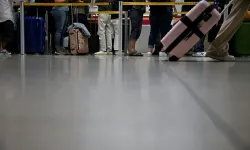European countries have started to increase border controls with their neighbors in the fight against irregular migration. In a statement, German Interior Minister Nancy Faeser announced that border controls will be increased at the borders with Poland and Czechia this week to tackle the influx of migrants. "If we fail to better protect the external borders, then the open borders within the EU are in danger," she said. Stating that the focus of the new measures will be on human smugglers, Faeser said that smugglers facilitate the passage of a quarter of migrants entering Germany and added: "We want to prevent the movement of smugglers through flexible and mobile controls in changing locations." Stating that the measures will be launched together with Poland and the Czech Republic, Faeser did not give details about the new measures, but stated that this information could fall into the hands of criminal networks.
'BORDERS IN SOUTHERN EUROPE NEED TO BE CLOSED'
Polish Government Spokesperson Piotr Muller said in a statement: "Germany's decision today is a consequence of the activities on the Balkan migration route. The Polish government believes that it is necessary to strengthen Europe's southern borders to prevent such a situation. The problem of border closures in southern Europe needs to be solved."
POLAND HAD INCREASED ITS CONTROLS
Poland had decided to tighten controls on the border with Slovakia as part of the fight against the influx of irregular migrants. Polish Prime Minister Mateusz Morawiecki stated yesterday that the Interior Ministry will check vehicles coming to Poland via Slovakia and said, "I have instructed the Interior Minister to introduce checks on minibuses, vans, cars and buses where there are suspicions that there are illegal migrants there."
66 PERCENT INCREASE IN MIGRANTS
In the first seven months of this year, first-time asylum applications in Germany increased by 78 percent, according to official data. According to police data, illegal border crossings increased by 66 percent to 14,701 in August compared to the same month last year.
Germany increases border controls with two countries
German Interior Minister Nancy Faeser announced this week that checks will be stepped up at the borders with Poland and the Czech Republic this week in a bid to cope with the influx of migrants.
Trending news

Snoop Dogg to carry the Olympic torch

Lily James Expresses Admiration for Hailey Bieber’s Rhode Skincare Line

Taylor Tomlinson Will Explore Her Faith and Sexuality on Tour!

'Alien mummy' in Peru raises eyebrows

Scandal in the heart of Europe: Child abuse in a church!

Kamala Harris’ Running Mate: Here’s Who Could Be Her VP After Biden Drops Out And Endorses Her






